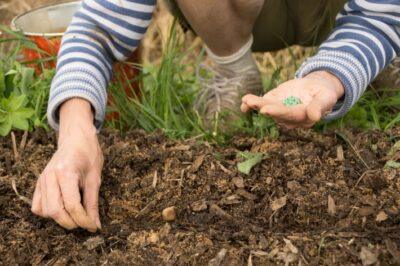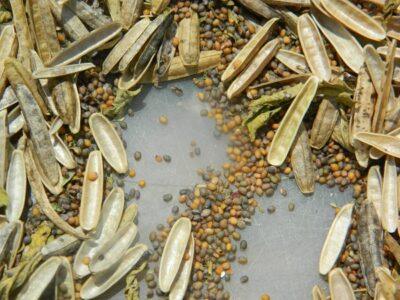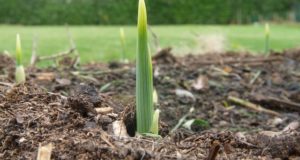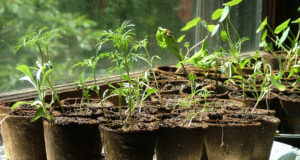
Image source: YourHomeWizards.com
The joys and benefits of gardening go well beyond fresh zucchini bread and homemade tomato sauce. Gardening is a satisfying hobby, a budget saver and a way to ensure fresh, chemical-free produce.
Of course, it can also be a silent protest against Big Ag and the evils of monoculture, GMOs, and bee-killing chemicals. But gardening can only be a stand against companies like Monsanto and others if they are not making a profit off of your garden.
If you follow issues related to food security, you may have heard that Monsanto owns about 40 percent of commercially available seed which is sold to the home gardener. Additionally, most of the major seed companies not owned by Monsanto purchase seed for resale from Monsanto affiliates.
And to add insult to injury, many of the commercially available fertilizers and plant food are also either owned by or affiliated with Monsanto. Scotts is a prime example as Scotts is the marketing agent for Monsanto’s Roundup. Therefore in addition to avoiding Monsanto seed (which will be the main thrust of this article), I also recommend avoiding Scotts products such as Miracle Gro, Osmocote, and Ortho.
New Natural Fertilizer Doubles Garden Production!
The sad truth is that Big Ag profits handsomely from the home garden market.
So what is a home gardener to do?
First of all, don’t panic. If you’ve already purchased seeds or plants of unknown origins, continue to enjoy them. It is too late to worry about Big Ag profits on these plants and you do not have to worry that they might be GMO. As of yet, genetically modified seed is not on the market for the home gardener.
Now, here are a few steps you can start taking:
Seed Saving
Saving your own seed can be a fun and rewarding experience. And in the case of many garden vegetables, it is pretty easy as well.
Leafy green plants such as lettuce, kale and arugula, once left to bolt, produce seed pods. Eventually, as the plant dies, the seed pods turn brown and brittle and are ready to be harvested. At the time of writing this, my overwintered kale literally has hundreds of seed pods, each containing dozens of seeds!
Seeds can also be easily collected from your peppers, melons, squash, etc. This seed is collected when you are ready to use the ripe fruit of these plants. Dry these seeds out for a few days on a plate or tray to keep them fresh and disease-free.
Buy Heirloom Seeds — They Taste Better And Are More Nutritious!
Tomatoes are trickier when it comes to seed saving, but it can still be done and it’s definitely worth the effort. To save tomato seeds, choose your best-looking fruit and scoop the seeds out with some of the tomato liquid and put them in a glass jar to ferment (if all the seeds are not covered in liquid, you can add a bit of water). After 2-3 days, you will start to notice a layer of mold and the tomato seeds will sink to the bottom. Clear away the mold and rinse your seeds free of any liquid, and then set them out to dry for a few days as you would with other fruit seeds.

Image source: Glory Garden
Whatever seeds you are saving, make sure you store them in a cool, dry place. The act of seed saving alone could be enough to ensure that you are not giving your hard-earned money to Big Ag.
Plant Exchanges
One of the really lovely things about gardening is that although you may usually start out doing it for yourself, you eventually end up with so many plants and seeds that you just can’t help but spreading the wealth!
Plant or seed exchanging can be as casual as a few friends getting together to trade extra plants or seeds that they do not need or do not have room for – or it can be something more structured. In my community, for example, we have a Master Gardener Club that arranges two public plant exchanges (spring and fall) each year.
Master Gardeners book space at a public location – such as a library or hall – and anyone is free to bring their excess plants. You put your plants on a table and are allowed to select other plants that you would like from the selection that others have brought.
Plant exchanges are not only a great way to keep Big Ag from profiting from your garden, but they are also a great way to meet other gardeners in your community!
Seed and Plant Purchases
Finally, you may have times when you simply are not able to get the seeds/plants that you are looking for by saving seed or through plant exchanges. In these cases you may just have to buy some. One way to avoid Big Ag from profiting off your garden is to buy heirloom seeds online.
There are plenty of good reasons to keep Big Ag from making money off your home garden, but for me the main reason is that I find many of their practices to be unethical. So why would I want to fund that? And why would you?
How do you keep Big Ag from making money off your garden? Leave your comment in the section below.
Sign up for Off The Grid News’ weekly email and get $600 worth of survival blueprints … free!
 Off The Grid News Better Ideas For Off The Grid Living
Off The Grid News Better Ideas For Off The Grid Living




